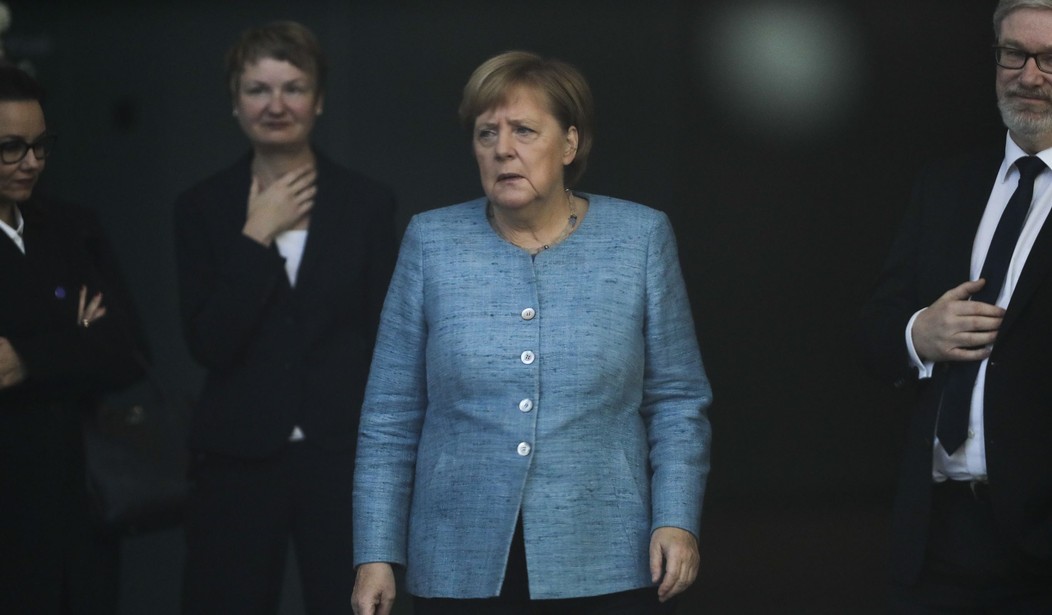Despite its cool Green parties and ambitious wind and solar agendas, Europe remains by far the world's largest importer of oil and natural gas.
Oil output in the North Sea and off the coast of Norway is declining, and the European Union is quietly looking for fossil fuel energy anywhere it can find it.
Europe itself is naturally rich in fossil fuels. It likely has more reserves of shale gas than the United States, currently the world's largest producer of both oil and natural gas. Yet in most European countries, horizontal drilling and fracking to extract gas and oil are either illegal or face so many court challenges and popular protests that they are neither culturally nor economically feasible.
The result is that Europe is almost entirely dependent on Russian, Middle Eastern and African sources of energy.
The American-Iranian standoff in the Middle East, coupled with radical drop-offs in Iranian and Venezuelan oil production, has terrified Europe -- and for understandable reasons.
The European Union has almost no ability to guarantee the delivery of critical oil and gas supplies from the Middle East should Iran close the Strait of Hormuz or harass ships in the Persian Gulf.
Europe's only maritime security is the NATO fleet -- a synonym for the U.S. Navy.
Vladimir Putin's Russia supplies an estimated 30 percent of Europe's oil needs. In times of crisis, Putin could exercise de facto control over the European economy.
In other words, Europe refuses to develop its own gas and oil reserves, and won't fund the necessary military power to ensure that it can safely import energy from problematic or even hostile sources.
Recommended
It's no wonder that Europe's traditional foreign policy reflects these crazy paradoxes.
Energy neediness explains why the EU was so eager to maintain the so-called "Iran deal" with the theocracy in Tehran, and also why it was nervous about the anti-Russia hysteria that arose in the United States after the 2016 election.
Past European distancing from Israel reflected Europe's fear of alienating Arab oil producers in the Middle East and North Africa.
Europeans are also uneasy about the Trump administration. They see the current U.S. government as nationalist and unpredictable. Americans appear not so ready as in the past to enter the world's hotspots to ensure unimpeded commercial use of sea and air lanes for the benefit of others.
The result is a sort of European schizophrenia when it comes to America and foreign policy in general. On one hand, the European Union resents its military dependence on Washington, while on the other it prays for its continuance. The EU loudly promotes freedom and democracy abroad, but it is careful to keep ties with oil-exporting Middle Eastern autocracies that are antithetical to every value Europeans promote.
Germany agrees with its allies that Russian imperial agendas could threaten European autonomy. But privately, Berlin reassures Putin's Russia that it wants to buy all the gas and oil that Moscow has to sell. Germany increasingly seems far friendlier with a suspicious Russia than it is with an America that protects it.
In sum, what ensures that Europeans have enough daily gasoline and home heating fuel are not batteries, wind farms and solar panels -- much less loud green proselytizing. They count instead on a mercurial Russia, an array of unstable Middle Eastern governments and an underappreciated U.S. military.
In a logical world, Europeans would retake control of their own destiny. That recalibration would entail beefing up their military power, and their navies in particular.
They also would begin to frack and horizontally drill. Europeans would push ahead with more nuclear power, hydroelectric projects and clean-coal technologies -- at least until new sources of clean energies become viable.
Europe should applaud U.S. gas and oil development, which has upped world supplies, diversified suppliers and lowered global prices. Europeans should especially remember that the U.S. military keeps global commerce safe for all vulnerable importers such as themselves.
But these remedies are apparently seen in Europe as worse than the disease of oil and gas dependency.
The result is again chaos. Europe lectures about greenhouse gases while it desperately seeks supplies of fossil fuels. Germany usually sets the tone in Europe, and it is the most hypocritical in both denouncing and buying fossil fuels from unsavory sources.
The danger for Europe now is that the charade may soon be over.
Americans are self-sufficient in gas and oil. They have lost interest in Middle East quagmires and petro-regimes. And they don't like patrolling the world for countries that both count on and ankle-bite the U.S. military. Meanwhile, the more Europeans pander to oil-rich Russia, Iran and various Gulf states, the less respect they earn in return.
It is hard to be both the world largest importer of gas and oil and the loudest critic of fossil fuels, but Europe has managed to do it.

























Join the conversation as a VIP Member